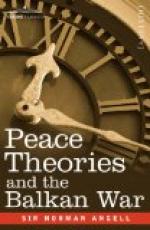I am aware that very often at present they are not so subjected. Dominated as our political thought is by Roman and feudal imagery—hypnotised by symbols and analogies which the necessary development of organised society has rendered obsolete—the ideals even of democracies are still often pure abstractions, divorced from any aim calculated to advance the moral or material betterment of mankind. The craze for sheer size of territory, simple extent of administrative area, is still deemed a thing deserving immense, incalculable sacrifices.
* * * * *
And yet even these ideals, firmly set as they are in our language and tradition, are rapidly yielding to the necessary force of events. A generation ago it would have been inconceivable that a people or a monarch should calmly see part of its country secede and establish itself as a separate political entity without attempting to prevent it by force of arms. Yet this is what happened but a year or two since in the Scandinavian peninsula. For forty years Germany has added to her own difficulties and those of the European situation for the purpose of including Alsace and Lorraine in its Federation, but even there, obeying the tendency which is world-wide, an attempt has been made at the creation of a constitutional and autonomous government. The history of the British Empire for fifty years has been a process of undoing the work of conquest. Colonies are now neither colonies nor possessions. They are independent States. Great Britain, which for centuries has made such sacrifices to retain Ireland, is now making great sacrifices in order to make her secession workable. To all political arrangements, to all political ideals, the final test will be applied: Does it or does it not make for the widest interests of the mass of




